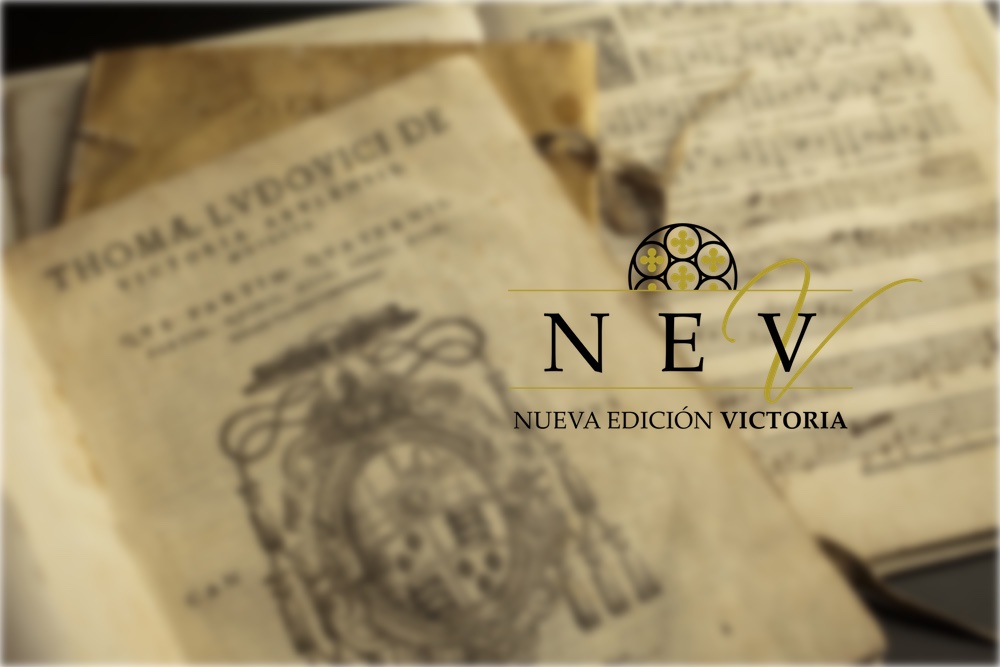A NEW LOOK AT 1572 VICTORIA MOTETS
Tomás Luis de Victoria Research Center begins the publication of the work of Tomás Luis de Victoria with the fourteen motets for four voices of his Motecta que partim quaternis, partim quinis, alia senis, alia octonis vocibus concinuntor (Venice, 1572). The aim is to make available a quality edition, one that combines scientific rigor with a clear intention to serve a musical performance. Without doubt, any edition is a child of his own time – so is the New Edition Victoria (NEV). It should be well noted that it has been designed and developed from its inception with the specific purpose of being offered online.
It seems logical that the NEV starts at the beginning: the early works contained in the editio princeps of the composer. These constituted a group of valued and widely interpreted creations throughout the centuries. During the lifetime of Victoria they formed an almost stable corpus, which was reprinted six times in cities around the Catholic world (see Appendix to the Critical Apparatus). With the passing of history and since the seventeenth century, these motets – some more than others – have been copied in many different formats, which shows their survival, even before being reintroduced by the Cecilian Movement of the late nineteenth century. From the last century and until today, they have also been recorded and, of course, spread across the Internet. An example: today (03/02/16) in Spotify we can find at least two versions of each motet.
The longevity of this repertoire allows us to verify how his music has been adapted to the tastes of each era. This gives rise to our stated intention to focus this edition on the composer’s first published works, most likely selected by Victoria himself. From this objective, the «Critical Commentary» was prepared in depth and with care, and made available with the edition. In addition, preceding each composition, we provide additional information of each piece. The explicit intent of all this is to facilitate the interpreter’s understanding of the work.
Among the information offered for each piece there is also the text, collected in different ways: under the heading «1572 Print» we provide it as it is in the edition of Victoria, respecting the musical-textual units created by the Spaniard in his compositions. From this text, which is nothing other than the particular text “reading” of Victoria, we made our proposal of a Spanish translation. We also include the canonical texts of the motets in Latin, selected from sources chronologically preceding and as close as possible to the 1572 print, always chosen from sources available online that allow for their free consultation. Thinking in a wider dissemination, we also provide translations of the texts into English, also available openly in the network (as far as it was possible).

Although our attention has been focused on Motecta (1572), we have overlooked the other prints published in Victoria lifetime, containing these creations. Therefore, for each motet, all variants of text and music have been reviewed in the Critical Commentary.
These works have been preceded by quite a few editions, to which we would like to offer a deserved homage. Some motets appeared in the relevant edition by Karl Proske, Musica Divina (Pustet, Regensburg, Germany, 1853-1876). In the early twentieth century, Felipe Pedrell offered the integral corpus, forming the iconic Opera omnia. Tomae Ludovici Victoria Abulensis (Breitkopf und Härtel, Leipzig, 1902-1913). This edition would serve as a model for subsequent European Opera omnia. During the sixties, Samuel Rubio and Higinio Anglés, almost simultaneously, reissued these motets according to the taste of times. Probably, the latter proposal, which formed part of the new Opera omnia of Victoria, published by the CSIC, has been the most widely spread so far. However, in 2009, Adriano Giardina focused his doctoral thesis in these motets, offering a score edition, without «annotating or deleting anything from the editor», not even the necessary changes relating to musica ficta.
Considering all the previous work, our edition has its own character, a result of synergy between research and practice. This can be seen, for example, in sound, rhythmic and textual differences in relation to the various musical editions that have preceded it. Even if such changes are not quantitatively numerous, we think they are qualitatively relevant and, as a result, provide identity to the whole.
Finally, I would like to express my gratitude to João Figueiredo, the winning candidate of the Abvlensis, 2015 Scholarship, for his magnificent work on this edition. We dedicate also our best recognition to the public and private institutions that help us to continue another year with the announcement of this grant, which has proven so fruitful.
SOTERRAÑA AGUIRRE RINCÓN
Responsible for the edition

